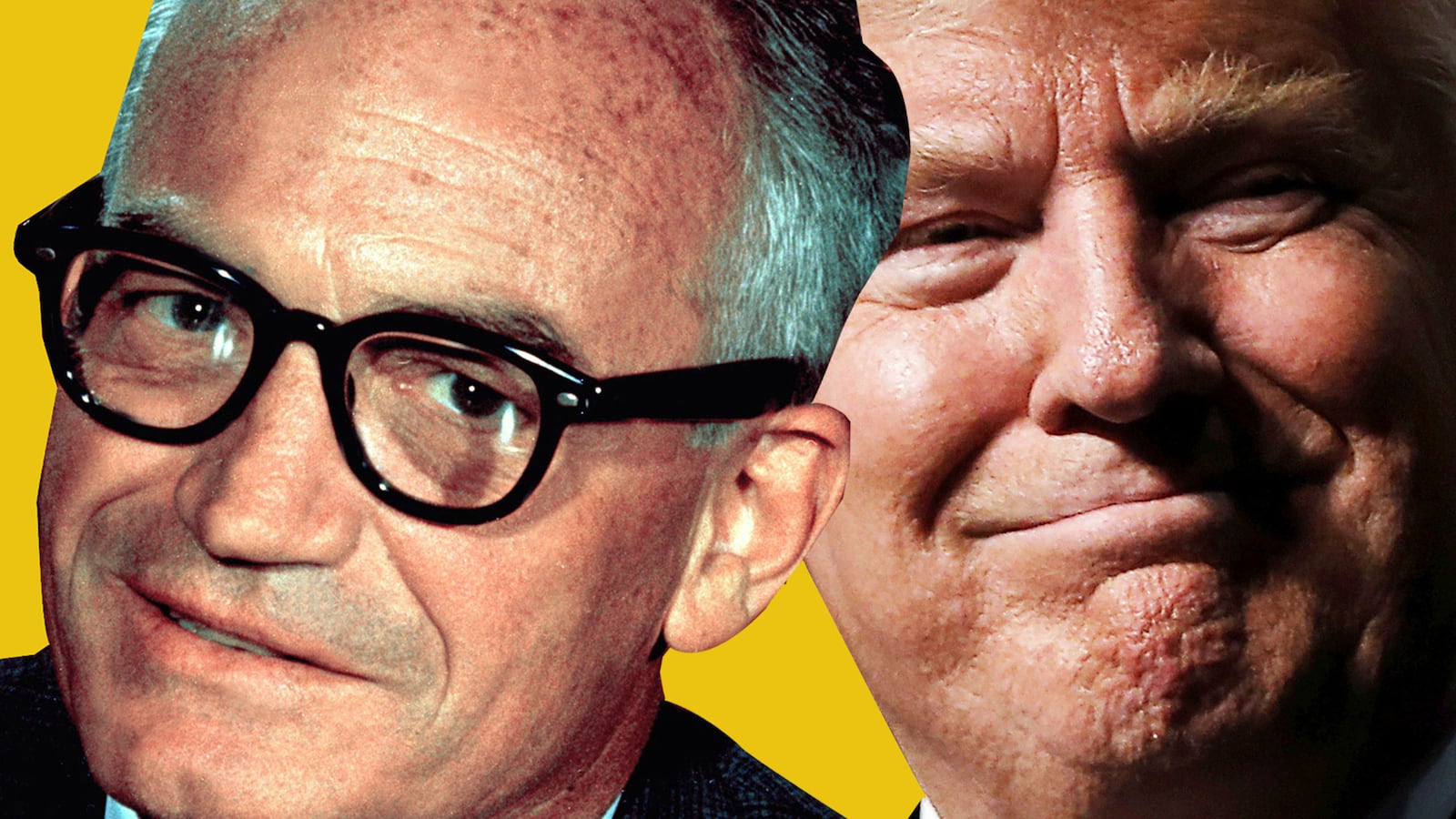Historians, trained to take the long view but living in the here and now, have been struggling to make sense of Donald Trump’s chaotic bid to win the presidency and thus become the commander-in-chief of the most powerful military force in the world.
Never before have so many global strategy mandarins of the Republican Party dismissed their nominee as “reckless” and fundamentally unfit to serve as president. That verdict was delivered by 50 GOP foreign policy elites this summer in a blistering collective denunciation. The establishment’s fears about Trump were no doubt exacerbated when MSNBC host Joe Scarborough reported early last month that Trump asked one of his foreign policy advisers three times in a single briefing why the United States could not use nuclear weapons in its military operations.
The closest historical parallel to the anxiety and existential doubt stimulated by Trump may be the 1964 presidential election, when Lyndon Johnson’s campaign rolled to a landslide win by assailing Barry Goldwater as a bellicose and reckless extremist. The depiction has stuck, to a large extent, down through the decades.
In reality, the Arizonan was a model of stability, experience, and strategic continuity compared to Donald Trump.
At first blush the two men seem similar in key respects: bluntly outspoken in their views, divisive inside their party and out, and rhetorically careless on the subject of nuclear weapons and their potential use (about which more below).
But it’s the differences that stand out, strikingly so the closer you examine them. Unlike this year’s Republican standard-bearer, Goldwater in 1964 had considerable experience as a public servant, having served two terms in the U.S. Senate. He was a lifelong Republican, whereas Trump has variously flirted with the Democratic Party and called himself an Independent before declaring himself a Republican at the start of this race. And Goldwater, notwithstanding his hard-right views, was an amiable individual in interpersonal relations, courteous and tactful in his dealings with political opponents. He had difficulties with the press, but was generally respectful toward individual journalists.
In contrast to Trump, who has ricocheted wildly in his policy positions and seems to have no core values beyond personal aggrandizement, Goldwater was consistent in his views, dependably conservative and hewing to a libertarian position on government’s role in society. He had a reputation for personal integrity. On race relations Goldwater voted against the 1964 Civil Rights Act (on constitutional grounds), but he had backed civil rights legislation in Arizona over a long period of time, and ended racial segregation in his family department stores. He was no bigoted ethno-nationalist like Trump.
Even on national security, we should resist drawing a straight line between the two men. The contrasts are stark. Goldwater’s foreign policy, while hawkish on many issues, was well within the Cold War consensus—on the Soviet Union, on China, on Vietnam, and on most other issues. The common perception of him as a walking powder keg derives primarily from his infamous convention speech in 1964 (“extremism in defense of liberty is no vice”), but that address was designed to revive a flagging campaign with rhetorical fervor. It was not a reflection of outlandish policy ideas on the core issues of the Cold War. A veteran himself, Goldwater honored America’s servicemen and women on a regular basis; the notion of him denigrating the service of his fellow Arizonan John McCain as Trump has done is impossible to imagine. Nor can one picture him disparaging the military and threatening to fire its current leadership as Trump did in a recent televised forum.
As both senator and presidential nominee, Goldwater advocated fidelity to allies in Europe and Asia, firmness in response to Moscow’s aggression, and consistency with the bipartisan doctrine of containment. Trump, on the other hand, has transformed his national security vision into a series of discrete commercial negotiations devoid of geostrategic logic. For him, it’s about insisting that allies pay for the protection Washington provides. He asked in 2013: “How long will we go on defending South Korea from North Korea without payment? When will they start to pay us?”
With respect to Baltic nations, the refrain is the same: the United States should defend them against an attack by Russia only if they had first “fulfilled their obligations to us.” NATO, Trump has said more than once in this campaign, is “obsolete.” He has promised to consider recognizing Russia’s annexation of Crimea and end sanctions against Moscow. Trump’s bizarrely naïve infatuation with the cunning Vladimir Putin was on display once again in recent days, as he lavished praise on the Russian autocrat and waved aside concerns about Moscow’s suppression of the media and interventions into neighboring countries.
It is inconceivable to imagine that Goldwater—or any other nominee of the party of Dwight Eisenhower, Ronald Reagan and George H.W. Bush—would have advocated transforming NATO or America’s alliances in Asia into mob-style protection rackets as Trump has consistently proposed.
True, on nuclear weapons Goldwater in his day generated consistent concerns. In May 1963, he caused widespread uproar when he suggested on the ABC “Issues and Answers” program that “defoliation of the forests by low-yield atomic weapons” could achieve wonders in the battle against insurgents in South Vietnam. That October, he referred to the nuclear bomb as “merely another weapon” in America’s arsenal, a suggestion he repeated the following spring.
At no point did Goldwater explicitly advocate that atomic weapons be used. Democrats nonetheless relished painting him as a warmonger who if elected would use the bomb on Hanoi or Moscow or both. The notorious “Daisy” television commercial—the first attack ad in history, it is often said—juxtaposes a little girl in a meadow plucking a flower and an ominous countdown and exploding nuclear mushroom cloud. “These are the stakes,” intones LBJ. “We must either love each other, or we must die.” Although it aired only once, the commercial captured the acute fear about Goldwater as commander-in-chief that Trump has engendered today among national security experts and voters in both parties.
But even on this issue Goldwater had two qualities in his favor that Trump utterly lacks: a relatively even temperament and a basic if rudimentary knowledge of the workings of the international system. Trump’s constant need to respond aggressively to even minor slights, his unalloyed narcissism, and his fundamental lack of stability makes the prospect of him holding the nuclear authenticators profoundly terrifying.
Such is the state of affairs this campaign season: The candidate previously considered the most extreme presidential nominee of either party in modern U.S. history suddenly looks the picture of maturity and moderation.
Gordon M. Goldstein is an adjunct Senior Fellow at the Council on Foreign Relations. Fredrik Logevall is a professor of international affairs and history at Harvard University.







